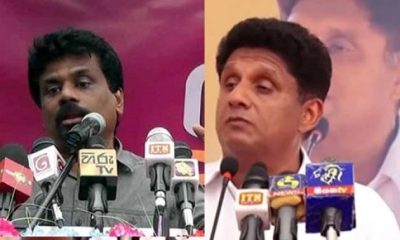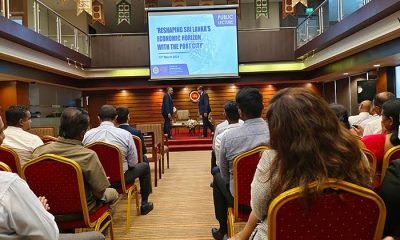Opinion
Debate or no debate, addressing critical issues important for voters

by Gamini Jayaweera
In recent weeks, we have observed a disheartening spectacle unfold between the Samagi Jana Balawegaya (SJB) and the JVP-led National People’s Power (NPP) as they engage in a futile tussle, each blaming the other for the failure to arrange a debate between their respective leaders and economic policy teams. This debate, crucial for enlightening the voting populace ahead of both the Presidential and General elections, remains elusive due to the entrenched animosity between the parties.
Consequently, the electorate grapples with disillusionment and disenchantment, triggered by the pervasive negative posturing exhibited by these factions, all while professing to champion system change and advocate for a governance model marked by inclusivity and transparency.
Both party leaders exude an air of unwavering confidence, believing they possess the panacea for our nation’s longstanding woes — be it the chronic mismanagement of the economy, the bloated and inefficient public sector, the archaic and dysfunctional constitution, the ailing healthcare system, the dilapidated state of education, or the pervasive corruption staining our political landscape and workforce. Yet, despite their professed solutions, they balk at the opportunity to engage in a substantive debate, opting instead for recycled rhetoric hailing their past ministerial achievements as the ultimate testament to their capabilities.
It begs the question: if they deeply hold the keys to resolving these entrenched issues, why shy away from a platform that could elucidate their strategies and policies for the benefit of undecided voters? As they bask in the glow of favourable poll numbers and draw sizable crowds to their political rallies, it becomes imperative to scrutinise their positions on critical matters. Therefore, I have taken it upon myself to pose several pressing questions, hopeful that the responses from these leaders will empower our electorate to make informed decisions come election day.
Economic Reforms
The promises of providing food for the impoverished, lowering essential commodity prices, ensuring equitable education, and universal healthcare are praiseworthy. However, the glaring question remains: how do they intend to finance these initiatives in the short term? Both parties have criticised current tax policies, labelling them unjustifiable burdens on the populace.
If elected, how do the NPP and the SJB plan to fill the revenue gap created by abolishing these taxes? Moreover, what strategies will they employ to stimulate economic growth and attract local and foreign investments? What specific details on their proposed policies and initiatives would provide voters with a clearer understanding of their economic reform agendas?
Public Sector Reform
It is evident that the public sector is bloated and inefficient, draining taxpayer funds without delivering commensurate value. Bold restructuring is necessary to curb waste and instil accountability. Yet, such reforms inevitably entail job losses. How do the SJB and the NPP propose to restructure these institutions while mitigating the impact on workers?
How will the administration ensure that displaced workers are effectively supported through redeployment, comprehensive redundancy packages, or access to retraining programs for alternative career pathways? Moreover, in the case of redeployment, where will these individuals find available vacancies and which industries will offer opportunities for retraining? Additionally, how will the necessary funds be allocated to ensure substantial redundancy packages for those affected by workforce transitions?
Administrative Service
The Sri Lanka Administrative Service (SLAS) comprises trained professionals, adept at government procedures. They collaborate closely with the President, the Prime Minister, and Ministers to formulate and execute policies, maintaining political neutrality and upholding SLAS integrity.
However, recent years have seen a decline in SLAS professionalism and integrity due to appointments based on political connections rather than merit. Can the NPP and the SJB commit to reversing this trend by appointing qualified SLAS officers to Secretarial positions in the ministries?
Diplomatic Service and International Relations
The image and reputation of a country rely heavily on competent diplomats who advocate for its interests globally. Historically, skilled diplomats have upheld our nation’s dignity and earned respect through responsible and professional representation in international relations.
Regrettably, recent appointments within the Foreign Service have often prioritised personal connections and political affiliations over merit. This neglects career diplomats and well-trained civil servants, leading to a decline in our international standing. Can the NPP and SJB assure they will not perpetuate this trend?
Public Sector Procurement Process
In 2017, the then President grimly revealed that over 50% of Sri Lanka’s public procurement contracts were tainted by the insidious grip of bribery and corruption. Shockingly, despite this alarming disclosure, successive governments, including the current administration, have regrettably fallen short in instituting the requisite measures to combat this pervasive menace, which continues to corrode the very fabric of our society.
The woeful underperformance of certain state institutions can be attributed to a myriad of factors. On one hand, these organizations suffer from a glaring absence of vision, transparency, accountability, and efficient systems and procedures. On the other hand, they turn a blind eye to the imperative of corporate governance, as rampant corruption infects the procurement process of public contracts and fosters a culture of unethical conduct. Furthermore, a dearth of business acumen at the leadership echelon has only exacerbated the lacklustre performance exhibited by most of our state institutions.
What are NPP and SJB proposals to implement a transparent public sector Procurement Process to ensure that the government is getting value for taxpayers’ money?
Public Sector Car Permits
It is widely acknowledged that certain professional groups in our society receive exclusive benefits from the government, including free car permits for vehicle imports and reserved placements for their children in prestigious government schools. The rationale behind these privileges raises questions: why are these groups afforded special treatment that is not extended to other government sector employees? Is it because they possess significant industrial influence, capable of exerting considerable pressure on the government through strike actions? Shouldn’t the government prioritise valuing the contributions of all its employees equally?
Trade Unions
Trade unions wield considerable influence in our society, often resorting to strikes as a means of protest. While legitimate grievances deserve to be addressed, politically motivated se the nation. What measures will the parties introduce to ensure that trade unions act responsibly and transparently? Could the NPP and the SJB potentially implement Trade Union laws requiring strikes to undergo democratic balloting, along with mandated clear notice periods aimed at minimizing disruption?
Pension Reform of Parliamentarians
The issue of full pensions for ministers and MPs after a mere ten years of service raises questions of fairness and equity. How do the parties plan to address this disparity and align the pension schemes of public servants with those of other citizens?
Dual Citizenship
The prohibition on dual citizens holding positions of responsibility within the government sector restricts the talent pool available to enact meaningful change. They are gathering in thousands for political meetings organised by the NPP. If so, what reforms will NPP and SJB propose to tap into the expertise of the overseas community while safeguarding against corruption and political interference?
Port City
The creation of a 25-year Tax Holiday zone with other incentives, called Port City within Sri Lanka to encourage foreign investors is under severe criticism from opposition parties due to many reasons. Reports suggest the introduction of a distinct tax system in the Port City, diverging from the national tax framework in Sri Lanka. This development raises concerns about the potential adverse effects of a dual tax system, including the demotivation of the workforce and economic inefficiencies. Considering these concerns, what proposals are being considered by the SJB and the NPP to reform this disparate tax structure and ensure uniformity across the country’s tax regime?
I understand that despite the proposed 25-year tax holiday, foreign investors are hesitant to participate in the scheme. It appears that as of now, there have been no tangible investments made by foreign entities in the Port City. How do you plan to ensure the success of this project, or will you allow it to languish as another ‘White Elephant’ doomed to inevitable failure?
Constitutional Reforms
The Executive Presidency and the Proportional Representation electoral system have been criticised by many politicians as well as the public for increased corruption and political favouritism compared to the introduction of the current system with the previous electoral system which operated prior to 1978.
During a rally in Sweden, the leader of the NPP party passionately advocated for Proportional Representation, emphasing its role in allowing minority communities to have their voices heard in Parliament. He argued that ensuring adequate representation from minority groups is crucial for fostering peace and harmony among diverse communities. However, this argument appears weak when considering the reality that major political parties like NPP, SJB, UNP, and SLPP often fail to provide opportunities for minority leaders to emerge within their ranks.
By neglecting to cultivate leadership from minority communities, these parties effectively bar individuals from those backgrounds from ascending to the positions of President or Prime Minister. It is worth noting that parties such as the NPP and the SJB could learn from examples set by the Conservative Party in the UK and the Democratic Party in the USA, both of which have seen leaders of Indian and African origin rise to the positions of Prime Minister and President, respectively. The question then arises: why hinder the possibility for a Tamil, a Muslim, or any member of another community to lead your party? Do you believe it would be beneficial to reduce sectarian voting by encouraging minorities to hold prominent positions within the major political parties?
Will your party commit to abolishing the Executive Presidency if elected to form the next government? Additionally, do you pledge to fully implement the 13th Amendment to the Constitution, thereby granting Provincial Councils comprehensive powers, including control over the police force? During a rally in Canada, when asked these crucial questions, the leader of the NPP evaded providing a clear answer, suggesting that it was not an immediate priority. However, it is vital for voters to have this information before casting their democratic ballots in the upcoming election.
Judiciary
It is a well-known factor that some of the Judges and the President Counsel have been appointed by the governing party based on political affiliations rather than the qualifications, experience, and suitability of the person to those positions. What are your proposals to introduce reforms in this area to ensure that the Judiciary is free from making politically motivated decisions and it will be free from political interference?
Appointment of Heads of Forces
There have been plenty of criticism, arguments, and accusations about appointing Heads for the three Forces. What Proposals do you have to ensure that those selections are done by independent Commissions attached to these Forces and the appointments are made on the recommendations by these commissions?
Environment
During the last few decades Politicians, Businessmen and Party supporters have been given the permission to clear out well established forests and other green sites and build commercial properties such as tourist hotels, golf courses, etc. These construction sites have destroyed the natural habitat making the weather patterns behave in strange ways. What are your proposals to protect our forests and the natural habitat from corrupt businesspeople, political henchmen, and politicians?
Conclusion
In conclusion, the voting public deserves clarity and accountability from those vying for leadership. There are many other valid questions and I hope that the voters will raise those issues in coming months. It is incumbent upon the SJB and the NPP to rise above partisan squabbles and engage in substantive dialogue. I believe that only through informed debate can we pave the way for a brighter future for Sri Lanka and her people.
Opinion
Child food poverty: A prowling menace
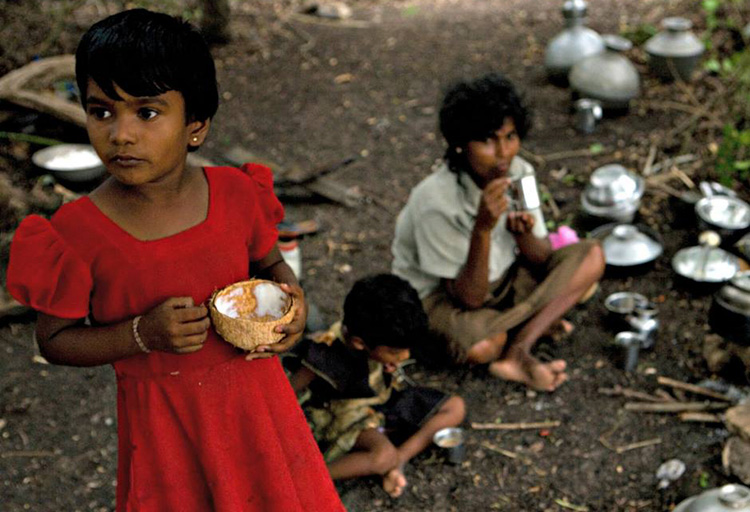
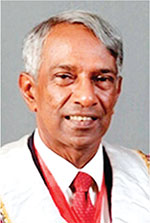 by Dr B.J.C.Perera
by Dr B.J.C.Perera
MBBS(Cey), DCH(Cey), DCH(Eng), MD(Paed), MRCP(UK), FRCP(Edin),
FRCP(Lon), FRCPCH(UK), FSLCPaed, FCCP, Hony FRCPCH(UK), Hony. FCGP(SL)
Specialist Consultant Paediatrician and Honorary Senior Fellow,
Postgraduate Institute of Medicine, University of Colombo, Sri Lanka.
Joint Editor, Sri Lanka Journal of Child Health
In an age of unprecedented global development, technological advancements, universal connectivity, and improvements in living standards in many areas of the world, it is a very dark irony that child food poverty remains a pressing issue. UNICEF defines child food poverty as children’s inability to access and consume a nutritious and diverse diet in early childhood. Despite the planet Earth’s undisputed capacity to produce enough food to nourish everyone, millions of children still go hungry each day. We desperately need to explore the multifaceted deleterious effects of child food poverty, on physical health, cognitive development, emotional well-being, and societal impacts and then try to formulate a road map to alleviate its deleterious effects.
Every day, right across the world, millions of parents and families are struggling to provide nutritious and diverse foods that young children desperately need to reach their full potential. Growing inequities, conflict, and climate crises, combined with rising food prices, the overabundance of unhealthy foods, harmful food marketing strategies and poor child-feeding practices, are condemning millions of children to child food poverty.
In a communique dated 06th June 2024, UNICEF reports that globally, 1 in 4 children; approximately 181 million under the age of five, live in severe child food poverty, defined as consuming at most, two of eight food groups in early childhood. These children are up to 50 per cent more likely to suffer from life-threatening malnutrition. Child Food Poverty: Nutrition Deprivation in Early Childhood – the third issue of UNICEF’s flagship Child Nutrition Report – highlights that millions of young children are unable to access and consume the nutritious and diverse diets that are essential for their growth and development in early childhood and beyond.
It is highlighted in the report that four out of five children experiencing severe child food poverty are fed only breastmilk or just some other milk and/or a starchy staple, such as maize, rice or wheat. Less than 10 per cent of these children are fed fruits and vegetables and less than 5 per cent are fed nutrient-dense foods such as eggs, fish, poultry, or meat. These are horrendous statistics that should pull at the heartstrings of the discerning populace of this world.
The report also identifies the drivers of child food poverty. Strikingly, though 46 per cent of all cases of severe child food poverty are among poor households where income poverty is likely to be a major driver, 54 per cent live in relatively wealthier households, among whom poor food environments and feeding practices are the main drivers of food poverty in early childhood.
One of the most immediate and visible effects of child food poverty is its detrimental impact on physical health. Malnutrition, which can result from both insufficient calorie intake and lack of essential nutrients, is a prevalent consequence. Chronic undernourishment during formative years leads to stunted growth, weakened immune systems, and increased susceptibility to infections and diseases. Children who do not receive adequate nutrition are more likely to suffer from conditions such as anaemia, rickets, and developmental delays.
Moreover, the lack of proper nutrition can have long-term health consequences. Malnourished children are at a higher risk of developing chronic illnesses such as heart disease, diabetes, and obesity later in life. The paradox of child food poverty is that it can lead to both undernutrition and overnutrition, with children in food-insecure households often consuming calorie-dense but nutrient-poor foods due to economic constraints. This dietary pattern increases the risk of obesity, creating a vicious cycle of poor health outcomes.
The impacts of child food poverty extend beyond physical health, severely affecting cognitive development and educational attainment. Adequate nutrition is crucial for brain development, particularly in the early years of life. Malnutrition can impair cognitive functions such as attention, memory, and problem-solving skills. Studies have consistently shown that malnourished children perform worse academically compared to their well-nourished peers. Inadequate nutrition during early childhood can lead to reduced school readiness and lower IQ scores. These children often struggle to concentrate in school, miss more days due to illness, and have lower overall academic performance. This educational disadvantage perpetuates the cycle of poverty, as lower educational attainment reduces future employment opportunities and earning potential.
The emotional and psychological effects of child food poverty are profound and are often overlooked. Food insecurity creates a constant state of stress and anxiety for both children and their families. The uncertainty of not knowing when or where the next meal will come from can lead to feelings of helplessness and despair. Children in food-insecure households are more likely to experience behavioural problems, including hyperactivity, aggression, and withdrawal. The stigma associated with poverty and hunger can further exacerbate these emotional challenges. Children who experience food poverty may feel shame and embarrassment, leading to social isolation and reduced self-esteem. This psychological toll can have lasting effects, contributing to mental health issues such as depression and anxiety in adolescence and adulthood.
Child food poverty also perpetuates cycles of poverty and inequality. Children who grow up in food-insecure households are more likely to remain in poverty as adults, continuing the intergenerational transmission of disadvantage. This cycle of poverty exacerbates social disparities, contributing to increased crime rates, reduced social cohesion, and greater reliance on social welfare programmes. The repercussions of child food poverty ripple through society, creating economic and social challenges that affect everyone. The healthcare costs associated with treating malnutrition-related illnesses and chronic diseases are substantial. Additionally, the educational deficits linked to child food poverty result in a less skilled workforce, which hampers economic growth and productivity.
Addressing child food poverty requires a multi-faceted approach that tackles both immediate needs and underlying causes. Policy interventions are crucial in ensuring that all children have access to adequate nutrition. This can include expanding social safety nets, such as food assistance programmes and school meal initiatives, as well as targeted manoeuvres to reach more vulnerable families. Ensuring that these programmes are adequately funded and effectively implemented is essential for their success.
In addition to direct food assistance, broader economic and social policies are needed to address the root causes of poverty. This includes efforts to increase household incomes through living wage policies, job training programs, and economic development initiatives. Supporting families with affordable childcare, healthcare, and housing can also alleviate some of the financial pressures that contribute to food insecurity.
Community-based initiatives play a vital role in combating child food poverty. Local food banks, community gardens, and nutrition education programmes can help provide immediate relief and promote long-term food security. Collaborative efforts between government, non-profits, and the private sector are necessary to create sustainable solutions.
Child food poverty is a profound and inescapable issue with far-reaching consequences. Its deleterious effects on physical health, cognitive development, emotional well-being, and societal stability underscore the urgent need for comprehensive action. As we strive for a more equitable and just world, addressing child food poverty must be a priority. By ensuring that all children have access to adequate nutrition, we can lay the foundation for a healthier, more prosperous future for individuals and society as a whole. The fight against child food poverty is not just a moral imperative but an investment in our collective future. Healthy, well-nourished children are more likely to grow into productive, contributing members of society. The benefits of addressing this issue extend beyond individual well-being, enhancing economic stability and social harmony. It is incumbent upon us all to recognize and act upon the understanding that every child deserves the right to adequate nutrition and the opportunity to thrive.
Despite all of these existent challenges, it is very definitely possible to end child food poverty. The world needs targeted interventions to transform food, health, and social protection systems, and also take steps to strengthen data systems to track progress in reducing child food poverty. All these manoeuvres must comprise a concerted effort towards making nutritious and diverse diets accessible and affordable to all. We need to call for child food poverty reduction to be recognized as a metric of success towards achieving global and national nutrition and development goals.
Material from UNICEF reports and AI assistance are acknowledged.
Opinion
Do opinion polls matter?
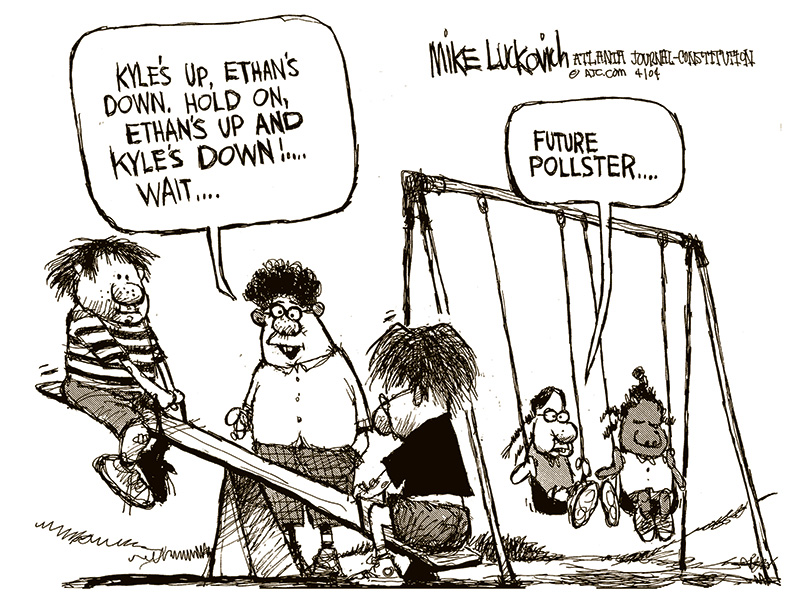
By Dr Upul Wijayawardhana
The colossal failure of not a single opinion poll predicting accurately the result of the Indian parliamentary election, the greatest exercise in democracy in the world, raises the question whether the importance of opinion polls is vastly exaggerated. During elections two types of opinion polls are conducted; one based on intentions to vote, published during or before the campaign, often being not very accurate as these are subject to many variables but exit polls, done after the voting where a sample tally of how the voters actually voted, are mostly accurate. However, of the 15 exit polls published soon after all the votes were cast in the massive Indian election, 13 vastly overpredicted the number of seats Modi’s BJP led coalition NDA would obtain, some giving a figure as high as 400, the number Modi claimed he is aiming for. The other two polls grossly underestimated predicting a hung parliament. The actual result is that NDA passed the threshold of 272 comfortably, there being no landslide. BJP by itself was not able to cross the threshold, a significant setback for an overconfident Mody! Whether this would result in less excesses on the part of Modi, like Muslim-bashing, remains to be seen. Anyway, the statement issued by BJP that they would be investigating the reasons for failure rather than blaming the process speaks very highly of the maturity of the democratic process in India.
I was intrigued by this failure of opinion polls as this differs dramatically from opinion polls in the UK. I never failed to watch ‘Election night specials’ on BBC; as the Big Ben strikes ‘ten’ (In the UK polls close at 10pm} the anchor comes out with “Exit polls predict that …” and the actual outcome is often almost as predicted. However, many a time opinion polls conducted during the campaign have got the predictions wrong. There are many explanations for this.
An opinion poll is defined as a research survey of public opinion from a particular sample, the origin of which can be traced back to the 1824 US presidential election, when two local newspapers in North Carolina and Delaware predicted the victory of Andrew Jackson but the sample was local. First national survey was done in 1916 by the magazine, Literary Digest, partly for circulation-raising, by mailing millions of postcards and counting the returns. Of course, this was not very scientific though it accurately predicted the election of Woodrow Wilson.
Since then, opinion polls have grown in extent and complexity with scientific methodology improving the outcome of predictions not only in elections but also in market research. As a result, some of these organisations have become big businesses. For instance, YouGov, an internet-based organisation co-founded by the Iraqi-born British politician Nadim Zahawi, based in London had a revenue of 258 million GBP in 2023.
In Sri Lanka, opinion polls seem to be conducted by only one organisation which, by itself, is a disadvantage, as pooled data from surveys conducted by many are more likely to reflect the true situation. Irrespective of the degree of accuracy, politicians seem to be dependent on the available data which lend explanations to the behaviour of some.
The Institute for Health Policy’s (IHP) Sri Lanka Opinion Tracker Survey has been tracking the voting intentions for the likely candidates for the Presidential election. At one stage the NPP/JVP leader AKD was getting a figure over 50%. This together with some degree of international acceptance made the JVP behave as if they are already in power, leading to some incidents where their true colour was showing.
The comments made by a prominent member of the JVP who claimed that the JVP killed only the riff-raff, raised many questions, in addition to being a total insult to many innocents killed by them including my uncle. Do they have the authority to do so? Do extra-judicial killings continue to be JVP policy? Do they consider anyone who disagrees with them riff-raff? Will they kill them simply because they do not comply like one of my admired teachers, Dr Gladys Jayawardena who was considered riff-raff because she, as the Chairman of the State Pharmaceutical Corporation, arranged to buy drugs cheaper from India? Is it not the height of hypocrisy that AKD is now boasting of his ties to India?
Another big-wig comes with the grand idea of devolving law and order to village level. As stated very strongly, in the editorial “Pledges and reality” (The Island, 20 May) is this what they intend to do: Have JVP kangaroo-courts!
Perhaps, as a result of these incidents AKD’s ratings has dropped to 39%, according to the IHP survey done in April, and Sajith Premadasa’s ratings have increased gradually to match that. Whilst they are level pegging Ranil is far behind at 13%. Is this the reason why Ranil is getting his acolytes to propagate the idea that the best for the country is to extend his tenure by a referendum? He forced the postponement of Local Governments elections by refusing to release funds but he cannot do so for the presidential election for constitutional reasons. He is now looking for loopholes. Has he considered the distinct possibility that the referendum to extend the life of the presidency and the parliament if lost, would double the expenditure?
Unfortunately, this has been an exercise in futility and it would not be surprising if the next survey shows Ranil’s chances dropping even further! Perhaps, the best option available to Ranil is to retire gracefully, taking credit for steadying the economy and saving the country from an anarchic invasion of the parliament, rather than to leave politics in disgrace by coming third in the presidential election. Unless, of course, he is convinced that opinion polls do not matter and what matters is the ballots in the box!
Opinion
Thoughtfulness or mindfulness?

By Prof. Kirthi Tennakone
ktenna@yahoo.co.uk
Thoughtfulness is the quality of being conscious of issues that arise and considering action while seeking explanations. It facilitates finding solutions to problems and judging experiences.
Almost all human accomplishments are consequences of thoughtfulness.
Can you perform day-to-day work efficiently and effectively without being thoughtful? Obviously, no. Are there any major advancements attained without thought and contemplation? Not a single example!
Science and technology, art, music and literary compositions and religion stand conspicuously as products of thought.
Thought could have sinister motives and the only way to eliminate them is through thought itself. Thought could distinguish right from wrong.
Empathy, love, amusement, and expression of sorrow are reflections of thought.
Thought relieves worries by understanding or taking decisive action.
Despite the universal virtue of thoughtfulness, some advocate an idea termed mindfulness, claiming the benefits of nurturing this quality to shape mental wellbeing. The concept is defined as focusing attention to the present moment without judgment. A way of forgetting the worries and calming the mind – a form of meditation. A definition coined in the West to decouple the concept from religion. The attitude could have a temporary advantage as a method of softening negative feelings such as sorrow and anger. However, no man or woman can afford to be non-judgmental all the time. It is incompatible with indispensable thoughtfulness! What is the advantage of diverting attention to one thing without discernment during a few tens of minute’s meditation? The instructors of mindfulness meditation tell you to focus attention on trivial things. Whereas in thoughtfulness, you concentrate the mind on challenging issues. Sometimes arriving at groundbreaking scientific discoveries, solution of mathematical problems or the creation of masterpieces in engineering, art, or literature.
The concept of meditation and mindfulness originated in ancient India around 1000 BCE. Vedic ascetics believed the practice would lead to supernatural powers enabling disclosure of the truth. Failing to meet the said aspiration, notwithstanding so many stories in scripture, is discernable. Otherwise, the world would have been awakened to advancement by ancient Indians before the Greeks. The latter culture emphasized thoughtfulness!
In India, Buddha was the first to deviate from the Vedic philosophy. His teachers, Alara Kalama and Uddaka Ramaputra, were adherents of meditation. Unconvinced of their approach, Buddha concluded a thoughtful analysis of the actualities of life should be the path to realisation. However, in an environment dominated by Vedic tradition, meditation residually persisted when Buddha’s teachings transformed into a religion.
In the early 1970s, a few in the West picked up meditation and mindfulness. We Easterners, who criticize Western ideas all the time, got exalted after seeing something Eastern accepted in the Western circles. Thereafter, Easterners took up the subject more seriously, in the spirit of its definition in the West.
Today, mindfulness has become a marketable commodity – a thriving business spreading worldwide, fueled largely by advertising. There are practice centres, lessons onsite and online, and apps for purchase. Articles written by gurus of the field appear on the web.
What attracts people to mindfulness programmes? Many assume them being stressed and depressed needs to improve their mental capacity. In most instances, these are minor complaints and for understandable reasons, they do not seek mainstream medical interventions but go for exaggeratedly advertised alternatives. Mainstream medical treatments are based on rigorous science and spell out both the pros and cons of the procedure, avoiding overstatement. Whereas the alternative sector makes unsubstantiated claims about the efficacy and effectiveness of the treatment.
Advocates of mindfulness claim the benefits of their prescriptions have been proven scientifically. There are reports (mostly in open-access journals which charge a fee for publication) indicating that authors have found positive aspects of mindfulness or identified reasons correlating the efficacy of such activities. However, they rarely meet standards normally required for unequivocal acceptance. The gold standard of scientific scrutiny is the statistically significant reproducibility of claims.
If a mindfulness guru claims his prescription of meditation cures hypertension, he must record the blood pressure of participants before and after completion of the activity and show the blood pressure of a large percentage has stably dropped and repeat the experiment with different clients. He must also conduct sessions where he adopts another prescription (a placebo) under the same conditions and compares the results. This is not enough, he must request someone else to conduct sessions following his prescription, to rule out the influence of the personality of the instructor.
The laity unaware of the above rigid requirements, accede to purported claims of mindfulness proponents.
A few years ago, an article published and widely cited stated that the practice of mindfulness increases the gray matter density of the brain. A more recent study found there is no such correlation. Popular expositions on the subject do not refer to the latter report. Most mindfulness research published seems to have been conducted intending to prove the benefits of the practice. The hard science demands doing the opposite as well-experiments carried out intending to disprove the claims. You need to be skeptical until things are firmly established.
Despite many efforts diverted to disprove Einstein’s General Theory of Relativity, no contradictions have been found in vain to date, strengthening the validity of the theory. Regarding mindfulness, as it stands, benefits can neither be proved nor disproved, to the gold standard of scientific scrutiny.
Some schools in foreign lands have accommodated mindfulness training programs hoping to develop the mental facility of students and Sri Lanka plans to follow. However, studies also reveal these exercises are ineffective or do more harm than good. Have we investigated this issue before imitation?
Should we force our children to focus attention on one single goal without judgment, even for a moment?
Why not allow young minds to roam wild in their deepest imagination and build castles in the air and encourage them to turn these fantasies into realities by nurturing their thoughtfulness?
Be more thoughtful than mindful?






